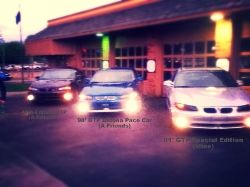I apologize in advance if the answers to my questions have already been covered in other posts, but I have an extensive situation on my hands that kind of just kept growing into more and more. And sorry for it having to be so longI just want to be thorough. The car in question is a 1995 Gp SE with 194XXXmi.
So I went to change the rotors and pads on the rear of the car along with all 4 wheel bearing hubs (I was very lucky to obtain moog/federal mogul parts...got all 4 bearings and the 2 front wheel speed sensors) . I took the tire off (as this was my last one, all other bearings and other rear pads and rotor were done) and after inspection I came to realize that the pads and rotor for the driver side rear were very rusty, but not worn much at all. After looking at the caliper I could see that the the sliding pins were completely seized and the caliper was not compressing the pads properly. Went to try and bleed the caliper, nothing, no fluid coming from the bleeder valve. Master Cylinder full, and the level in the MC reservoir wasn't moving at all after many attempts too bleed. So, I took out the banjo bolt, pressed the brake pedal down and still no fluid came from the brake hose. I figured the the brake hose had collapsed and caused the caliper to fail. I went to take the brake hose off of where it connects to the brake lines and (unfortunately) the previous owner of the car had sprayed rubber coating all over the brake lines and the fittings, so that wouldn't come off. Under the rubber coating that he had covered the line with, the line itself was rusty. Due to the brake hose becoming stuck to the brake line, and the entire lines extensive rust, I decided to replace both hose and line (changing the brake line all the way back to the ABS module). After doing this I tried to bleed the brakes again and still, no fluid.
After more research I found out the with the ABS system on these cars (if equipped) there is a piston in the ABS module that needs to be in the "home" position for the rear brakes to be bled. The recommended way to do this is, of course, an expensive Tech 1 scan tool that is hard to find as well. I've also read and I quote, "Without a scan tool, open the front bleeder screw at the modulator. There are two, so be sure you open the front one. Then bleed the modulator. Close the screw, then bleed both front brakes starting with the right one first. After checking for a firm pedal, drive the vehicle above three miles per hour. *The controller will automatically reset the system by commanding the rear motor to run to the home position. Once this has occurred, you can stop the vehicle and bleed the rear brakes."
ABS has been on sense I bought the car this past fall.
O'reilly's can't obtain the code for me, its not showing one but ABS light is still on.
Probably need that Tech 1 scanner
...I was expecting an average pad/rotor/wheel bearing hub job.
Now the new brake line doesn't have fluid in it, neither does the new caliper or brake hose, and the ABS light is still on.
So my questions are,
Do I need to get that ABS light off to properly bleed the brakes?
Will the controller still reset the system with the light on*?Isn't it bad to drive the car with that much air in the line? (New line, brake hose and caliper for the driver side rear)
Should I pour brake fluid in the new caliper and just try it?? ...I don't like the idea of any air in the lines if I'm going to drive it at all.
Is there any other way I can go about doing this without having to drive the car with air in the lines, and without the scan tool?
Do I possibly need a new ABS module because I replaced all hubs and wheel speed sensors? I did not replace sensors that are directly on ABS module.
**Is their anyone that could walk me through my next step? Because it had brakes when I started, they just squeaked in the rear. The front were done in January and worked fine, bled fine.
If anyone would like to chime in on my questions I would greatly appreciate it,and if any of you experts can provide any info/tips at all I would greatly appreciate it.
Credit to: Service Advisor: ABS Bleeding Procedures for Common GM Vehicles: Tomorrow's Technician for the quote.
P.S
If anyone one would like photos or more info I would be happy to provide.










